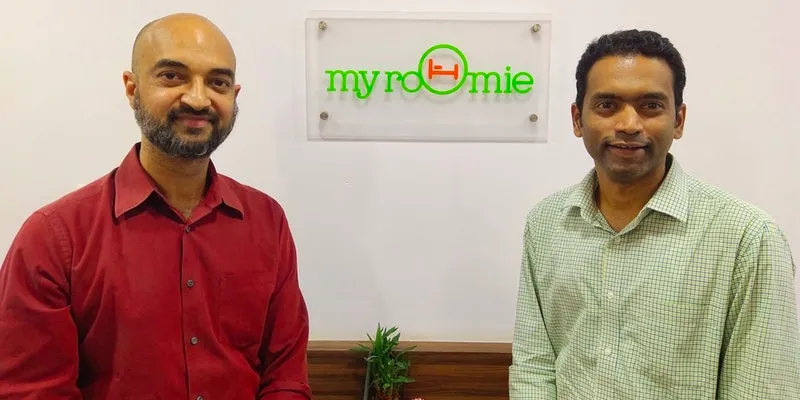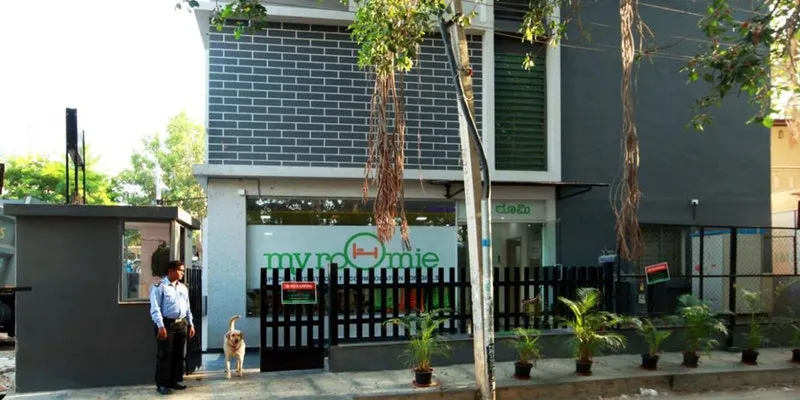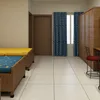Student accommodation startup MyRoomie is tapping technology to provide youngsters a home away from home
Founded by two IIM-B alumni, Bengaluru-based student accommodation startup MyRoomie offers facilities like surveillance and security, Wi-Fi, dining, gym, yoga, music, indoor games, and doctor and beautician on call.
Co-living startups are all the rage these days, with players like Stanza Living, Nestaway, Zolo Stays, Co-live, and biggies like OYO entering the market. Now, student accommodation, once limited to on- and off-campus hostels and barebones PG places, is gaining traction. Bengaluru-based student housing startup MyRoomie is among the many companies vying to tap this burgeoning market.
Founded by IIM-Bangalore alumni Dennis Basil and Arun Murthy in 2018, the startup aims to “make a difference in the student accommodation space in India, which is still stuck in time, apart from being massively fragmented and unorganised”.

MyRoomie co-founders and IIM-Bangalore alumni Dennis Basil and Arun Murthy wanted to create a difference in the student accommodation space in India.
It’s clear that the market presents a huge opportunity. A RedSeer report states that the market for co-living startups in India is expected to touch $2 billion by 2022. The overall segment, including paying guest accommodation, will be worth a whopping $93 billion over the next 10 years, according to a PropTiger report.
Reason enough for Dennis and Arun to embark on a shared entrepreneurial journey.
Getting started
The co-founders came together over a drink. “We met at an IIM-Bangalore alumni event. Both of us were entrepreneurs, passionate about real estate, and had the common vision of a differentiated foray into the space,” Arun says.
Their discussion veered towards student accommodation, and they realised that the choice for most off-campus housing currently was either restrictive college hostels (which cater to 20 percent of the capacity) or unstructured PG accommodation, neither of which served the needs of the student population.
Multiple reports reveal that most of the projected demand for co-living startups will come from college students and working professionals. India has over 50,000 colleges and more than 31 million students. College hostels accommodate around 3.4 million students, whereas the requirement is for over 8.9 million beds.
The co-founders of MyRoomie, realising that the market was dominated by students looking for comfortable and yet affordable housing, decided to stand out with a standardised offering in this unorganised sector.
Apart from accommodation, the startup provides facilities such as biometric access, surveillance and security, Wi-Fi, dining, tuck shop, yoga and music instruction, gym, indoor games, a zone to chill out, and doctor and beautician on call.
Backed by experience
Dennis, 48, Co-founder and CEO, worked for Honeywell Automation before co-founding Damden Properties, a real estate firm, in 1996.
Arun, Co-founder and COO, is an ex-Indian Army major who gained real estate experience while working for Coldwell Banker. He also learnt about new-age technologies while working for Moonraft Innovation Labs as sales director.
Together, the duo wants to make MyRoomie a true “home away from home” for students. Unlike traditional hostels and PGs, the startup taps technology, including IoT and data analytics, to solve day-to-day problems.
Arun says, “Our campuses will be IoT-enabled and we have already started a pilot project. The IoT data will help make informed decisions to enhance the experience of students, improve asset optimisation, ensure facilities management, and streamline business processes. This will, in turn, bring in energy and cost efficiencies as we scale.”
MyRoomie, which was initially bootstrapped by the co-founders, now has a core team of more than 20 employees and outsourced staff.
Little things matter
MyRoomie charges an average of Rs 12,000 per bed per month. Rates vary depending on the location and include lodging, food, housekeeping, maintenance, and security. The startup has currently two campuses in Bengaluru and offers a total of 500 beds.

Campus of MyRoomie
The co-founders say one big diffentiator is their “human factor”. Each campus has a dog that essentially functions as a common pet. The dogs (Pearl and Milo) are vaccinated, healthy, and trained.
“It’s the little things that matter. We are parents first and entrepreneurs next. The one question that I run in my mind at MyRoomie is: would I do this if my child was staying here? It’s a simple thing but when students play with our pet dogs, their stress levels plummet; energy and happiness levels increase. This is one way of providing social and emotional support to our students and help in their overall well being,” Dennis says.
The team also uses tech to optimise resources and ensure a better experience for students.
“We measure the weight of waste food every day. We use data analytics to find out about days when students didn’t like the food. Accordingly, we incorporate changes in food preparation and the menu to reduce waste and cater to their taste buds,” Dennis says.
Other features include libraries and attendance and payment systems that students and parents can access on their smartphones.
Room for much more
According to a KnightFrank report, as of February 2018, people in the 18-35-year age group made up 34 percent of India’s population. These are currently the ones driving the consumption story across different sectors, and real estate is a big chunk of that.
MyRoomie competes with other startups like OxfordCaps, TribeStays, and Campusville. Even other horizontal players like QuikrHomes, NestAway, and Zocalo have expanded their services to PGs and hostel spaces.
Dennis said, “One of the challenges was getting the right location at the right price point. Since we come from the industry, we understand the nuances and know how to profitably work around it. It took us a lot to take a few college authorities into confidence before we got our first business.” Currently they are also talking with a few colleges to provide hostel services to colleges. In B2C model, they operate these campuses independently.
Homing in on the future
The startup founded in 2018 secured angel funding of approximately $500,000 from multiple investors. It is also in discussions with multiple VCs for raising its next round of funding.
Arun says, “Our current revenue run rate is about Rs 6 crore and we are profitable unit wise.”
Going forward, the MyRoomie platform aims to create an entire ecosystem that addresses the needs of the graduate student market.
“This would include services like tuition, higher education, loans, fitness, entertainment, travel, and gaming in the near future,” Arun says, adding that they aim to expand to 10,000 beds across South India by the end of 2020.
(Edited by Teje Lele Desai)










